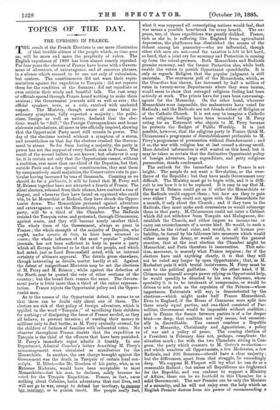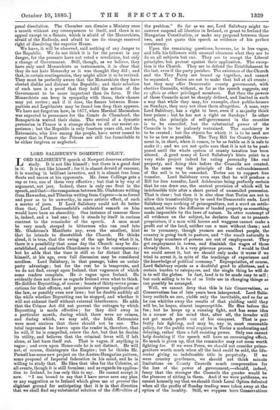TOPICS OF THE DAY.
THE UPRISING IN PRANCE.
THE result of the French Elections is one more illustration of that terrible silence of the people which, as time goes on, will be more and more the perplexity of rulers. The English experience of 1880 has been almost exactly repeated. For four years the electors of France have borne with a Govern- ment of adventure, of extravagance, and of sonorous phrases, in a silence which seemed to be one not only of submission, but content. The constituencies did not warn their repre- sentatives against the expedition to Tonquin; did not reprove them for the condition of the finances ; did not repudiate or even criticise their windy and boastful talk. The vast army of officials spread through France heard nothing to make them anxious ; the Government journals sold as well as ever ; the official speakers were, as a rule, received with unabated respect. The Ministry, though aware of some faint re- actionary symptoms, fully expected a majority ; the politi- cians, foreign as well as native, declared that the elec- tions would be "dull;" the Foreign Correspondents sent home elaborate calculations, all more or less officially inspired, showing that the Opportunist Party must still remain in power. The day of the elections arrived without a symptom of a storm, and nevertheless on that day the electors crushed the Govern- ment to atoms. So far from having a majority, the party in power has not the support of every fourth man in France. The result of the second ballots is not known ; but whatever it may be, it is certain not only that the Opportunists cannot, without a coalition, seat more than one-third of the Deputies, but that, outside Paris and a few special constituencies, they seat them by comparatively small majorities, the Conservative vote in par- ticular having increased by tens of thousands. Counting as we should do for a ple'biseite, it will be found that M. Ferry and M. Brisson together have not attracted a fourth of France. The silent electors, released from their silence, have emitted a roar of disgust, and wherever they have found an opponent who could win, be he Monarchist or Radical, they have struck the Oppor- tunist down. The Monarchists protested against adventure and extravagance; and the Monarchists, yesterday a forgotten party, will be a third of the Chamber. The Radicals resisted the Tonquin votes, and protested, through Clementeau, against waste, and they will become nearly another third. The whole force of the Government, always so great in France ; the whole strength of the majority of Deputies, who ought, under &rutin de liege, to have been returned en masse; the whole influence of the most " popular " political journals, has not been sufficient to keep in power a party which all Europe believed to be that of the people, and which had acted, just as Lord Beaconsfield acted, with an internal certainty of ultimate approval. The details given elsewhere, though interesting as details, matter hardly at all. Against the defeat of insignificant Ministers may be set the elections of M. Ferry and M. Brisson ; while against the defection of the North may be quoted the vote of other sections of the country ; but the broad facts remain the same. The Govern- ment party is little more than a third of the entire represen- tation. France rejects the Opportunist policy and the Oppor- tunist men. '
As to the causes of the Opportunist defeat, it seems to us that there can be doubt only about one of them. The electors are sick of that policy of foreign adventure, which is typified. in the word "Tonquin ;" of sacrificing their children for nothing ;• of dissipating the force of France needed, as they all believe, to prevent invasion • of wasting their money in millions only to find berths, as M. Ferry cynically avowed, for the children of fathers of families with influential votes. No observer throughout France doubts that the expedition to Tonquin is the chief of the offences that have been punished. M. Ferry's immediate organ admits it frankly. In one Department, Admiral Courbet's letters describing M. Ferry's mismanagement were circulated as manifestoes for the Monarchists. In another, the one charge brought against the Government was the death in Tonquin of certain local con- scripts. M. Ribot—the Mr. Goschen of his party, who, as an Extreme Moderate, would have been acceptable to most Monarchists—lost his seat, he declares, solely because he voted for the Tonquin Expedition. France, in fact, cares nothing about Colonies, hates adventures that cost lives, and will not go to war, except to defend her territory, 41./egmr lier territory, or to punish insult. Her people really feel,
what it was supposed all conscripting nations would feel, that war means a possible heartbreak for every hearth. The ex- pense, too, of these expeditions was greatly disliked. France, rich as she is, is suffering like England from agricultural depression, the phylloxera has diminished the means of the richest among her peasantry—who are influential, though other rich men are not—and the taxation is felt to hit hard, so hard, that a joint cry for economy and Protection is coming up from the cereal-growers. Both Monarchists and Radicals promise economy, and the former Protection also, while both enable the voters to punish Opportunist spendthrifts. It is only as regards Religion that the popular judgment is still uncertain. The enormous poll of the Monarchists, which, as the Guardian has shown, has increased by half a million of votes in twenty-seven Departments where they were beaten, would seem to show that outraged religious feeling had been actively at work. The priests have for years been canvassing- agents for the Monarchy. On the other hand, wherever Monarchists were impossible, the malcontents have voted for Radicals ; and the Radicals are not friends either of Religion or of the Catholic Church. It is not easy to imagine a Catholic whose religious feelings have been wounded by M. Ferry voting for an Extremist who objects to M. Ferry because he protects the Budget of Public Worship. It is just possible, however, that the religious party in France think M. Clemenceau's programme of disestablishment preferable to M. Ferry's programme of persecution without disendowment ; and if so, the war with religion has at last roused a strong recoil. More detailed information is still wanted on this head, but it may be taken as certain that the distinctive Opportunist policy of foreign adventure, large expenditure, and petty religions persecution, stands condemned.
The outlook for the immediate future in France is not bright. The people do not want a Revolution, or the over- throw of the Republic ; but they have made Government very difficult. The Ministry must go to begin with, and it is diffi- cult to see how it is to be replaced. It is easy to say that M. Ferry or M. Brisson could go on if either the Monarchists or the Radicals would support them ; but how are they to gain over either They could not agree with the Monarchists for a month, if only about the Church ; and if they turn to the Radicals, they must make such concessions as would submerge them in that party. M. Clemenceau could not enter a Cabinet which did not withdraw from Tonquin and Madagascar, dis- establish the Church, and either impose an income-tax or carry out retrenchments of a severe kind. He would, in such a Cabinet, be the virtual ruler, and would, in all human pro- bability, be forced by his followers into measures which would either annoy the Army, or would so intensify the general reaction, that at the next election the Chamber might be Monarchist, and Paris therefore in insurrection. This solu- tion, moreover, is scarcely what France requires ; for if the electors have said anything clearly, it is that they will not be ruled any longer by open Opportunists ; that, as X Rochefort pats it with brutal incisiveness, M. Perry must be sent to the political guillotine. On the other hand, if M. Olemenceau himself accepts power relying on Opportunist help, he would speedily be deserted by his own followers, whose speciality it is to be intolerant of compromise, or would be driven to acts such as the expulsion of the Princes—whose importance, Extremists will say, is demonstrated by the elections—which might make half France Monarchical. Even in England, if the House of Commons were split into three nearly equal parties, and one-third consisted of Par- nellites, Government would be impossible without coalition ; and in France the fissure between parties is of a far deeper kind—so deep, that coalition not only seems, but occasion- ally is, discreditable. You cannot combine a Republic and a Monarchy, Christianity and Agnosticism, a policy of war and a policy of peace. The coming election of a President in February does not, perhaps, complicate the situation much ; for with the two Chambers sitting in Con- gress, the party which consents to M. Grevy's re-election— and which numbers all Opportunists, a few Moderates, a few Radicals, and 200 Senators—should have a clear majority ; but the differences, apart from that struggle, lie exceedingly deep. We suppose M. Floquet will try what he can do as a reasonable Radical ; but unless all Republicans are frightened for the Republic, and can coalesce to support a Ministry of Affairs, there can be no foothold in this Chamber for a solid Government. The new Premier can be only the Minister of a minority, and he will not enjoy even the help which an English Premier derives from his power of recommending a • penal dissolution. The Chamber can dismiss a Ministry once a month without any consequences to itself, and there is no appeal except to a Senate, which is afraid of the Monarchists, afraid of the Radicals, and afraid to use its strange reserved right of dissolving the superior House.
We have, it will be observed, said nothing of any danger to the Republic. We do not think it is for the present in any danger, for the peasants have not voted a revolution, but only a change of Government. Still, though, as we believe, they have only used Monarchists as instruments, it is clear that they do not hate Monarchy as it was thought they did ; and that, in certain contingencies, they might allow it to be revived. They must be perfectly aware that the Monarchists they have elected dislike and distrust the Republic ; and their selection of such men is a proof that they hold the action of the Government to be more important than its form. If the Monarchists can keep in sympathy with them, their chance may yet revive ; and if it does, the fissure between Bona- partists and Legitimists may be found less deep than appears. We have not forgotten how, in 1877, when Marshal Macmahon was expected to pronounce for the Comte de Chambord, the Bonapartitts waived their claim. The revival of a dynastic pretension in France is a strange shock to all our recent ex- perience ; but the Republic is only fourteen years old, and the Extremists, who live among the people, have never ceased to repeat that in France the Princes are still too formidable to be either forgiven or neglected.



































 Previous page
Previous page